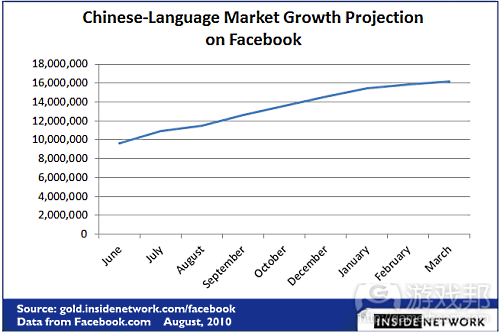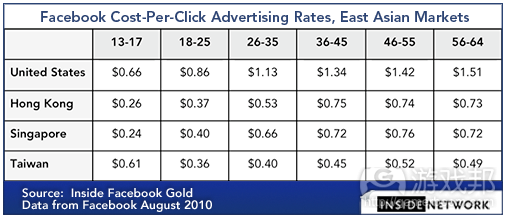简述中文版Facebook应用市场情况
游戏邦注:本文作者为Chris Morrison,文章主要阐述中文版Facebook应用的市场情况。原文发布于2010年9月1日,涉及数据以当时为准。
虽然中国大陆限制访问Facebook,但中文依然是Facebook第9大语言,这得归功于香港、新加坡和台湾用户。汉语用户呈稳步增长趋势,并开始引起某些Facebook大主顾的注意。
Zynga就是个典型的例子。早前这家顶级社交游戏开发商就推出了中文版《Zynga Poker》(游戏邦注:这是Zynga经典应用之一)。
然而Zynga不是通过推出新游戏进军中国市场,而是成立北京工作室,对既有应用进行本土化,面向1150万汉语用户重新打造作品。
Zynga之所以推出中文版Facebook游戏有数个原因。首先,对外国公司而言,中国并非能够轻易入驻的市场。中国政府规定,进入中国市场的外国公司须由中国公司控股,这曾让Zynga望而却步,直到公司意识到中国市场的巨大潜力。
幸运的是,Facebook是意图进军中国大陆市场开发商的极佳试验机会。香港是中国行政特区,而台湾省的文化和大陆联系密切。
Facebook游戏《Zynga Poker》主要同Elex和Boyaa之类的中国游戏开发商竞争中文用户,这些公司也有推出颇为成功的扑克游戏。外国开发商能够从取得成效获悉中国市场的潜力。
但进军Facebook中文市场的原因绝非仅是探测该市场。
第2个原因就是中文用户群体的社交玩家相比英语或西班牙语用户群而言,比例更高。我们从获悉的用户行为情况中发现,在1150万中文玩家中,有很大部分用户访问Facebook只是为了玩游戏。
此外,这些玩家不仅体验游戏,而且还花大笔资金购买虚拟商品(游戏邦注:早前就有预测称2010年的虚拟商品市场有望突破50亿美元)。所以东亚用户不仅增长速度快,且颇具价值。以下是我们对2011年汉语游戏市场发展趋势的预估:
香港、新加坡和台湾的总人口是3500万左右,所以自然会出现增长上限;但本土化既有游戏似乎是个制胜法宝。
至于用户本身,我们之前研究了3款应用在台湾市场的表现情况,结果表明这些应用的运作情况大不相同。
例如,体验这3款大型应用的玩家平均年龄是27岁。而美国或者其他西方国家的玩家平均年龄则高出10岁。
这些年轻玩家更倾向把自己的可支配收入用到线活动中,同时相比西方主流玩家而言,其获得成本也比较低。
下面就让我们来看看3大中文游戏市场的广告点击费率:
对那些希望入驻中文市场的开发商而言,成立北京工作室并非关键所在;据悉,当地有些发行商(游戏邦注:例如驻扎香港的6waves公司)专门向西方开发商提供本土化服务。(本文为游戏邦/gamerboom.com编译,如需转载请联系:游戏邦)
Where is Facebook’s Chinese-Language Population Heading? A Look at Future Growth and Reasons to Invest
By Chris Morrison
Editor’s note: The following data is an excerpt from Inside Facebook Gold, our research and data membership service covering Facebook’s platform and advertising ecosystem; it was also previously posted on Inside Facebook.
Nevermind China’s country-wide block on Facebook; the Chinese language is still the ninth-largest language on Facebook, thanks to Hong Kong, Singapore and Taiwan. Chinese is growing at a steady pace, and it’s beginning to draw the attention of some of Facebook’s biggest players.
Zynga is a case in point. Two weeks ago, the top social gaming company published a Chinese-language version of Zynga Poker, one of its flagship apps.
But rather than trying to reach China with the new game, where Zynga Beijing helped localize the app, the company settled for a release to Facebook’s 11.5 million Chinese-language users.
There were likely several motivations behind Zynga’s Facebook launch. The first is that China is not an easy market to push into, for a foreign company. The Chinese government requires that outside entrants be partially owned by a Chinese company — a hurdle that Zynga may not want to cross until it’s sure the project is worthwhile.
Luckily, Facebook can provide a great litmus test for entering the mainland. Hong Kong is an administrative region of China, while independent Taiwan is still culturally close (and often claimed by China as a province).
On Facebook, Zynga Poker will be competing for this cuturally Chinese audience, with actual Chinese game developers like Elex and Boyaa, which has its own successful poker game. The results should tell it how it might do in China.
There are other reasons to enter Facebook’s Chinese-language market beyond just testing for China itself, though.
The second is that the Chinese-language user group will likely contain more social game players, proportionately, than a similarly-sized group of English or Spanish speakers. Among the 11.5 million Chinese-language users, a large majority are visiting Facebook just to play games, judging both from what we’ve heard and seen in user behavior.
Additionally, these are users who not only play games, but spend freely on virtual goods within their games experience (as a side note, the virtual goods industry is estimated to surpass $5 billion this year). So, the East Asian user base is not only growing but also valuable. Here’s a rough estimate of how the Chinese-language market could continue to grow into next year:
The total population of Hong Kong, Singapore and Taiwan is around 35 million users, so there will obviously be some upper boundaries to growth; however, localizing existing games looks like a winning proposition from here.
As for the users themselves, our look at the performance of three apps in Taiwan earlier this month shows that there are more differences.
For instance, the average age of users playing the largest three games is around 27. In the United States or another Western country, the average age for a give group of apps would likely be a decade higher.
These youthful users, who have a strong propensity to put their disposable income into online activities, may also be cheaper to acquire than their counterparts in Western markets.
Here’s a look at cost-per-click ad rates across the three big Chinese-language markets:
For developers that do want to move their apps over, a Beijing office isn’t necessarily vital; some publishers in the region are offering localization services to Western developers, including Hong Kong-based 6waves, which we interviewed on the subject in July.
The full Facebook Global Language Report is available through a membership to Inside Facebook Gold, which also includes monthly data on total global audience growth and demographics. To learn more or join, please visit Inside Facebook Gold.(Source:insidesocialgames)
下一篇:社交游戏是否真是一场经济泡沫?









































 闽公网安备35020302001549号
闽公网安备35020302001549号